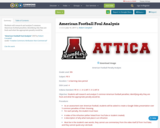
Students will research and analyze 5 common American football penalties; identifying why they are fouls and what the appropriate penalty would be.
- Subject:
- Physical Science
- Material Type:
- Activity/Lab
- Homework/Assignment
- Date Added:
- 07/14/2017

Students will research and analyze 5 common American football penalties; identifying why they are fouls and what the appropriate penalty would be.
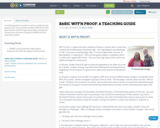
A teaching guide for teachers to instruct students in the gaming rules and procedures for Basic Wff'n Proof. This game teaches symbolic logic and problem solving. The content is an overview of the game of Wff'n Proof for interested coaches.

Students will practice asking permissions and making requests. With this activity students will be able to identify some of cultural etiquettes and values in South Korea. Students will also discuss different etiquettes from different cultures.
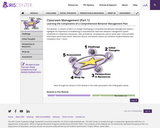
This Module—a revision of Who's In Charge? Developing a Comprehensive Behavior Management System—highlights the importance of establishing a comprehensive classroom behavior management system composed of a statement of purpose, rules, procedures, consequences, and an action plan. It also provides information about how culture, classroom factors, and teacher actions can influence student behavior (est. completion time: 1 hour).
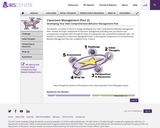
This Module—a revision of You're in Charge! Developing Your Own Comprehensive Behavior Management Plan—reviews the major components of classroom management (including rules, procedures, and consequences) and guides users through the steps of creating their own comprehensive behavior plan. The module is a companion to Classroom Management (Part 1): Learning the Components of a Comprehensive Behavior Management Plan (est. completion time: 2 hours).

D3: DYNAMIC DETROIT DATA@ BUNCHE ACADEMY IS A RESOURCE FOR STUDENTS, PARENTS AND TEACHERS TO USE TO FIND CURRICULUM RELATED WEBSITES. THIS IS A USEFUL ONE STOP LOCATION TO START YOUR SEARCH TO RELATED AGE APPROPRIATE CONTENT MATERIAL FOR STUDENT WORK.
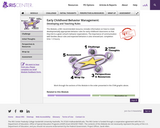
This Module, a DEC-recommended resource, includes information on how to create developmentally appropriate behavior rules for early childhood classrooms so that they link to a given school's behavior expectations. The importance of communication with families about rules and expected behaviors is also stressed (est. completion time: 1.5 hours).

Students are introduced to safety protocols by evaluating unsafe situations, sharing their ideas with their peers, developing a list of recommended safety protocols as a class, and finally, by comparing the class list to a standard list of safety rules. This activity seeks to demonstrate the importance of safety engineering and illustrate how it helps to prevent injuries and save lives. A PowerPoint® presentation, pre/post quiz and student handout are provided.

This will be a seminar on classic and contemporary work on central topics in ethics. The first third of the course will focus on metaethics: we will examine the meaning of moral claims and ask whether there is any sense in which moral principles are objectively valid. The second third of the course will focus on normative ethics: what makes our lives worth living, what makes our actions right or wrong, and what do we owe to others? The final third of the course will focus on moral character: what is virtue, and how important is it? Can we be held responsible for what we do? When and why?

This course provides practical instruction in the design and analysis of non-digital games. Students cover the texts, tools, references and historical context to analyze and compare game designs across a variety of genres, including sports, game shows, games of chance, card games, schoolyard games, board games, and role–playing games. In teams, students design, develop, and thoroughly test their original games to understand the interaction and evolution of game rules. Students taking the graduate version complete additional assignments.

This course is built around practical instruction in the design and analysis of non-digital games. It provides students the texts, tools, references, and historical context to analyze and compare game designs across a variety of genres. In teams, students design, develop, and thoroughly test their original games to better understand the interaction and evolution of game rules. Covers various genres and types of games, including sports, game shows, games of chance, card games, schoolyard games, board games, and role-playing games.

An historical examination and analysis of the evolution and development of games and game mechanics. Topics include a large breadth of genres and types of games, including sports, game shows, games of chance, schoolyard games, board games, roleplaying games, and digital games. Students submit essays documenting research and analysis of a variety of traditional and eclectic games. Project teams required to design, develop, and thoroughly test their original games.

This is a great question you might be asking yourself, and if you’re not asking it, you probably should be. If you are a native speaker of English, you don’t even have to think about it to use grammar correctly, at least for the most part. If you have ever watched a child develop language, you know that, at a very young age, children know what is necessary for language to make sense.

This is a PBL for first grade social studies about the importance of rules in the classroom, school, and community. This PBL will require students to create a set of classroom rules for the class to follow using either a video or poster.

This is a PBL for first grade social studies about the importance of rules in the classroom, school, and community. This PBL will require students to create a set of classroom rules for the class to follow using either a video or poster.
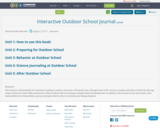
This resource will primarily be used prior to going to outdoor school for a 5th grade class. Though some of the resources might seem like a stretch for that age range it allows for some differentiation for those students that are looking to expand their knowledge base. In addition, this journal covers some basic rules and guidelines for living within a group of people which is why we include some dining etiquette.

In this lab, students will learn the rules of conversation labs at Boise State’s World Languages Resource Center (WLRC). They will then play an icebreaker game to introduce themselves to the rest of the lab. This game will cover things like their name and age, what they did over winter break, and what they often do on certain days. NCSSFL-ACTFL Can-Do Statements:I can introduce myself with my name and other relevant information. I can understand questions about myself and give one-word answers.I can give one-word answers to questions about my surroundings.

In order to teach, you need to have good classroom management. How will you deal with routines, transitions, and rules? What will make you an effective teacher? This is geared toward Early Childhood Education, but it can be adapted for secondary.

Students will use bullying in order to discover the importance of rules and laws and how they benefit each individual.

Google Slide presentation containing videos on multiple probability rules and application topics.